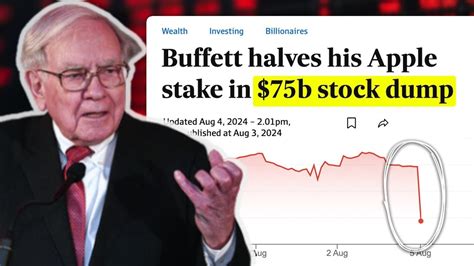
Warren Buffett’s Berkshire Hathaway significantly reduced its stake in longtime holdings Paramount Global and DaVita during the first quarter of 2024, while exiting its position in Sirius XM completely, according to the company’s latest 13F filing with the Securities and Exchange Commission released Wednesday. The moves signal a shift in Buffett’s investment strategy and raise questions about the future of these companies.
Berkshire Hathaway, renowned for its long-term investment approach, disclosed the sale of a substantial portion of its Paramount Global shares, cutting its holdings by approximately 78%. The firm sold 30,494,414 shares of Paramount Global, reducing its stake to 8,132,927 shares valued at $95 million as of March 31. This marks a considerable departure from Buffett’s previous confidence in the media conglomerate. Simultaneously, Berkshire Hathaway trimmed its investment in DaVita, a kidney care services provider, by approximately 25%, selling 6,345,479 shares. The remaining stake in DaVita is now 18,088,185 shares valued at around $2 billion. The complete exit from Sirius XM, while representing a smaller portion of Berkshire’s overall portfolio, further underscores the shift in investment priorities. Berkshire owned 39,786,824 shares of Sirius XM at the end of 2023.
The reasons behind these sales remain speculative, but analysts suggest a combination of factors may be at play. Paramount Global has faced challenges in the evolving media landscape, struggling to compete with streaming giants like Netflix and Disney+. The company’s debt load and uncertain future strategic direction may have prompted Buffett to reduce his exposure. “We are not surprised to see Berkshire trim its position in Paramount Global,” said Cathy Seifert, an analyst at CFRA Research. “The media industry is undergoing significant transformation, and Paramount’s position is not as secure as it once was.” DaVita, while a relatively stable business, might have been trimmed to reallocate capital to potentially higher-growth opportunities. The complete exit from Sirius XM may reflect a broader reassessment of Berkshire’s positions in the media and entertainment sectors, with concerns about long-term growth prospects in the face of rapidly evolving consumer preferences.
These moves come amidst a broader market environment characterized by economic uncertainty and evolving industry dynamics. Berkshire Hathaway’s investment decisions are closely watched by investors worldwide, often serving as a bellwether for market sentiment and strategic investment trends. The reduction in Paramount Global, DaVita, and the exit from Sirius XM, therefore, warrant close attention and analysis.
Paramount Global: A Struggling Media Giant
Paramount Global, formerly ViacomCBS, has been grappling with significant headwinds in recent years. The company owns a diverse portfolio of media assets, including CBS, Paramount Pictures, Nickelodeon, MTV, and Showtime. However, the transition from traditional linear television to streaming has posed considerable challenges. Paramount+ streaming service, while experiencing growth, has yet to achieve profitability and faces intense competition from established players.
The company’s debt burden, accumulated through acquisitions and investments in streaming, has further complicated its financial position. Paramount Global’s stock price has underperformed the broader market, reflecting investor concerns about its long-term prospects. Shari Redstone, whose family controls Paramount Global through National Amusements, has been exploring strategic options for the company, including potential mergers or acquisitions. These discussions have added further uncertainty to Paramount’s future. In early May 2024, reports emerged that Sony Pictures Entertainment and Apollo Global Management had jointly submitted a bid to acquire Paramount Global, potentially leading to a significant restructuring of the company. However, the future of this bid remains uncertain.
Buffett’s decision to significantly reduce Berkshire Hathaway’s stake in Paramount Global speaks volumes about his assessment of the company’s long-term viability. While he initially expressed confidence in Paramount’s management and assets, the evolving media landscape and Paramount’s challenges in adapting to the streaming era appear to have changed his outlook. His exit reflects a more cautious stance toward traditional media companies facing disruption from digital competitors.
DaVita: A Steady but Mature Business
DaVita is a leading provider of kidney care services in the United States, operating dialysis centers and providing related medical services to patients with chronic kidney disease. The company’s business is relatively stable, driven by the growing prevalence of kidney disease and the essential nature of dialysis treatment. However, DaVita’s growth prospects are limited by regulatory constraints and reimbursement pressures from government and private insurers.
While DaVita has consistently generated profits and cash flow, its stock price has not experienced significant growth in recent years. Berkshire Hathaway’s decision to trim its stake in DaVita may reflect a desire to reallocate capital to potentially higher-growth opportunities. The move could also be driven by a broader reassessment of Berkshire’s healthcare investments.
DaVita’s future remains dependent on its ability to navigate the complex regulatory and reimbursement landscape. The company faces ongoing pressure to control costs and improve the efficiency of its operations. While DaVita is likely to remain a stable and profitable business, its growth potential may be limited in the long term.
Sirius XM: The End of an Era
Berkshire Hathaway’s complete exit from Sirius XM marks the end of a relatively short investment in the satellite radio company. While the size of the stake was not a significant portion of Berkshire’s overall portfolio, the decision to sell all shares indicates a shift in investment strategy.
Sirius XM faces increasing competition from streaming music services such as Spotify and Apple Music. While Sirius XM has a loyal subscriber base and unique content offerings, its long-term growth prospects are uncertain in the face of rapidly evolving consumer preferences. The company’s debt load also adds to its financial challenges.
The decision to exit Sirius XM may reflect a broader reassessment of Berkshire’s positions in the media and entertainment sectors. Buffett may have concluded that Sirius XM’s long-term growth potential is limited, and that the capital could be better deployed elsewhere.
Berkshire Hathaway’s Broader Investment Strategy
Berkshire Hathaway’s investment decisions are closely watched by investors worldwide, often serving as a bellwether for market sentiment and strategic investment trends. The company’s portfolio is diversified across a wide range of industries, including insurance, energy, transportation, and consumer goods.
Buffett’s investment philosophy emphasizes long-term value investing, focusing on companies with strong competitive advantages, sound management teams, and attractive valuations. However, Berkshire Hathaway’s investment strategy has evolved over time, adapting to changing market conditions and industry dynamics.
The recent reductions in Paramount Global and DaVita, and the exit from Sirius XM, suggest a more cautious stance toward certain sectors and a greater emphasis on capital allocation to potentially higher-growth opportunities. These moves reflect a recognition that the business landscape is constantly evolving, and that even long-term investments need to be re-evaluated periodically.
Market Reaction and Analyst Commentary
The news of Berkshire Hathaway’s reduced stakes in Paramount Global and DaVita, and the exit from Sirius XM, has generated significant attention from investors and analysts. Paramount Global’s stock price experienced a decline following the disclosure, reflecting investor concerns about the company’s future prospects.
Analysts have offered various interpretations of Berkshire Hathaway’s moves. Some suggest that Buffett is becoming more cautious about the media industry, given the challenges facing traditional media companies in the digital age. Others believe that the sales are simply a reflection of Berkshire Hathaway’s ongoing portfolio management, with a focus on reallocating capital to more attractive investment opportunities.
“Berkshire’s trimming of its Paramount Global stake is a vote of no confidence in the company’s ability to navigate the streaming wars,” said David Trainer, CEO of New Constructs, an investment research firm. “Paramount is facing intense competition from Netflix, Disney+, and other streaming giants, and it is struggling to differentiate itself.”
Regardless of the specific reasons behind these sales, they underscore the importance of careful analysis and due diligence in investment decision-making. Even Warren Buffett, widely regarded as one of the greatest investors of all time, is not immune to making adjustments to his portfolio in response to changing market conditions.
Implications for Investors
Berkshire Hathaway’s investment decisions often have a significant impact on market sentiment and investor behavior. The recent reductions in Paramount Global and DaVita, and the exit from Sirius XM, may prompt other investors to re-evaluate their positions in these companies and the broader media and healthcare sectors.
Investors should carefully consider the factors that may have influenced Berkshire Hathaway’s decisions, including the challenges facing Paramount Global in the streaming era, the limited growth prospects of DaVita, and the increasing competition faced by Sirius XM.
It is important to conduct thorough research and analysis before making any investment decisions, and to diversify portfolios to mitigate risk. While Berkshire Hathaway’s investment decisions can provide valuable insights, they should not be the sole basis for investment decisions.
Conclusion: A Shifting Investment Landscape
Warren Buffett’s Berkshire Hathaway’s decision to significantly reduce its stake in Paramount Global and DaVita, and to exit Sirius XM completely, reflects a shifting investment landscape and a more cautious stance toward certain sectors. The moves underscore the challenges facing traditional media companies in the digital age, the limited growth prospects of some mature businesses, and the importance of adapting to changing market conditions.
Berkshire Hathaway’s investment decisions are closely watched by investors worldwide, and these recent moves are likely to have a significant impact on market sentiment and investor behavior. Investors should carefully consider the factors that may have influenced Berkshire Hathaway’s decisions and conduct thorough research and analysis before making any investment decisions. The media and healthcare industries are evolving rapidly, and investors need to be prepared to adapt their strategies accordingly. Buffett’s actions are a reminder that no investment is forever, and continuous evaluation is crucial for long-term success.
The broader implications suggest a potential de-risking of the Berkshire portfolio, potentially indicating a more conservative approach given prevailing economic uncertainties. While Berkshire still holds substantial cash reserves, these sales could foreshadow further portfolio adjustments as Buffett and his team navigate a complex global market. The industry will be watching closely to see where Berkshire Hathaway directs its capital next.
Frequently Asked Questions (FAQ)
1. Why did Warren Buffett’s Berkshire Hathaway sell a large portion of its Paramount Global shares?
Several factors likely contributed to Berkshire Hathaway’s decision to reduce its stake in Paramount Global. The media industry is undergoing a significant transformation with the rise of streaming services, posing challenges to traditional media companies. Paramount+’s growth, while present, struggles to compete with streaming giants like Netflix and Disney+. The company also carries a substantial debt load from previous acquisitions and investments in streaming. Buffett may have lost confidence in Paramount’s ability to successfully navigate these challenges and achieve sustainable long-term growth. Shari Redstone exploring the sale of Paramount also likely added uncertainty, prompting Buffett’s actions.
2. What does Berkshire Hathaway’s reduced investment in DaVita signify?
DaVita is a stable, profitable business providing essential kidney care services. However, its growth potential is limited by regulatory constraints and reimbursement pressures. Berkshire Hathaway’s decision to trim its DaVita stake likely reflects a desire to reallocate capital to potentially higher-growth opportunities. The move might also be part of a broader reassessment of Berkshire’s healthcare investments, aiming to optimize its portfolio for better returns. DaVita’s solid business but slower growth likely made it a candidate for trimming to free up capital.
3. Why did Berkshire Hathaway completely exit its position in Sirius XM?
Sirius XM faces increasing competition from streaming music services like Spotify and Apple Music. While Sirius XM has a loyal subscriber base and unique content, its long-term growth prospects are uncertain in the face of evolving consumer preferences. The company’s debt load also adds to its financial challenges. Berkshire Hathaway’s complete exit from Sirius XM suggests a reassessment of its media and entertainment holdings and a belief that the capital could be better deployed elsewhere with stronger growth prospects. The competitive landscape and Sirius XM’s debt likely contributed to the decision.
4. What are the broader implications of these sales for investors?
Berkshire Hathaway’s investment decisions are closely watched and often influence market sentiment. These sales may prompt other investors to re-evaluate their positions in Paramount Global, DaVita, Sirius XM, and the broader media and healthcare sectors. It underscores the importance of conducting thorough research and analysis before making investment decisions, considering factors like industry trends, competitive pressures, and company-specific challenges. The sales highlight the need for portfolio diversification and adaptation to changing market conditions, even for long-term investors.
5. What will Berkshire Hathaway do with the capital freed up from these sales?
The capital freed up from these sales provides Berkshire Hathaway with increased flexibility to pursue new investment opportunities. While the specific plans are unknown, Berkshire Hathaway is known for its disciplined approach to capital allocation, seeking companies with strong competitive advantages, sound management teams, and attractive valuations. Potential areas for investment could include sectors experiencing significant growth, such as technology, renewable energy, or infrastructure. The company may also consider acquisitions or strategic investments to further diversify its portfolio and enhance long-term returns. Berkshire’s substantial cash reserves give it considerable power to make strategic moves.









